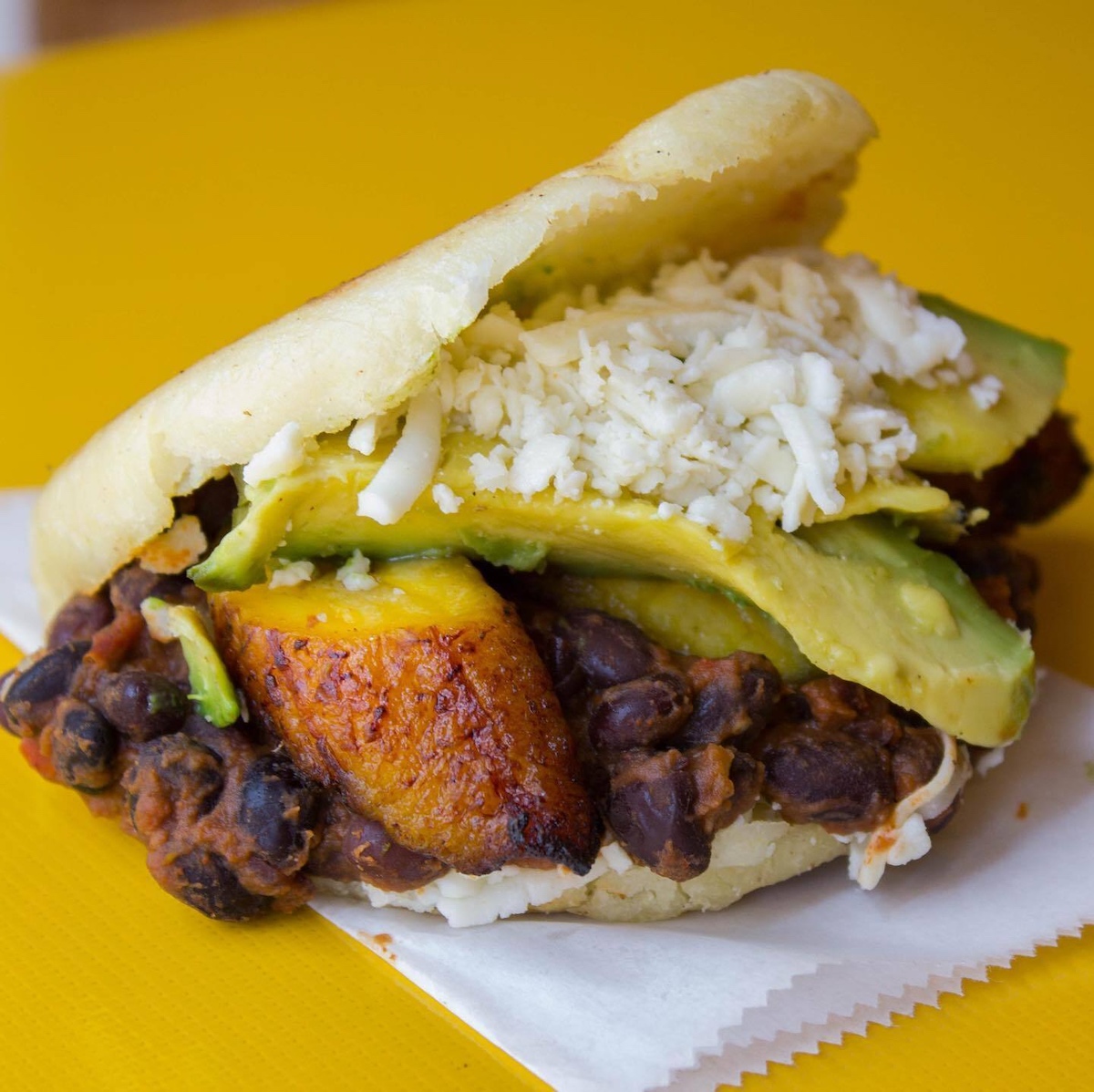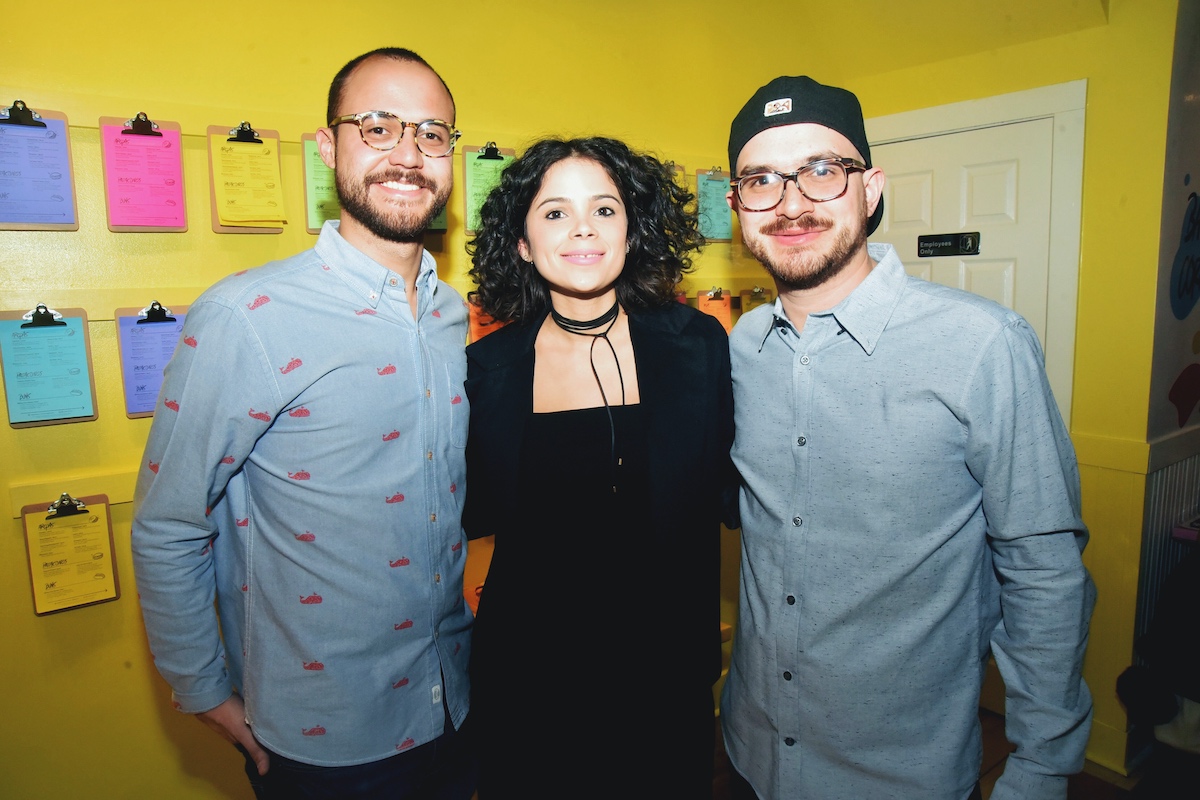
This article appears in a series on Black and Latinx entrepreneurship in Philadelphia and is underwritten by PIDC and Ben Franklin Technology Partners. It was independently reported and not reviewed by these partners before publication.
When Puyero owner Gilberto Arends and his wife Manuela Villasmil moved to Philadelphia from Venezuela in 2011, they quickly fell in love with the city’s thriving food scene. What confounded them was that such a big city had only one Venezuelan restaurant.
The couple believed that if they built a local Venezuelan restaurant that sold tasty items like arepas or patacones, they would have a hit.
It turns out that they were right.
“When we opened Puyero up, we kind of expected to have a place where Venezuelans felt at home,” he told Technical.ly. “If you move to Miami, Houston or any country in South America it’s easy to feel connected to people in your community. In Philly, there were not as many Venezuelans. We knew that Puyero would become that home away from home.”
Puyero’s offerings of arepas (cornmeal patties with various fillings) and patacónes (flattened plantain sections fried hard) speak to Venezuela’s identity as a country that’s more similar to its Caribbean neighbors than those in South America.
Since opening Puyero in 2017, Arends has partnered with Villasmil and his brother Simon Arends to serve Venezuelan food and host special events on major Venezuelan occasions like the country’s July 5 independence day, where they have worked with city officials to serve food at City Hall.
Venezuelan roots and resources for growth
Growing up in Venezuela, Arends was surrounded by business owners. His father owned a plant nursery and his grandfather owned farms. He never taught of them as entrepreneurs as much as people who worked for themselves and happened to own businesses. Seeing family members own businesses always piqued the Arends brothers’ interests.
Unlike his father and grandfather, Arends’ generation grew to know a different county than the one in which they flourished. Growing up, Venezuela had been a country that became home to Lebanese, Portuguese and other immigrants. The country had a large Italian population following World War II and after an oil boom in the 1960s and ’70s, more people moved into the country.
In recent years, Venezuela has been a country in turmoil. A devastated economy and human rights strife are among the issues that have caused many Venezuelans like Arends to leave for other countries. He first saw Philadelphia in 1997 while visiting an aunt and loved the city. That sentiment later manifested itself into a permanent move to the U.S.
“We’re the first generation forced to be immigrants,” he said. “Political, economic and social crises led to it being a place you couldn’t live.”
Arends said that opening a business in Venezuela tends to be a “very difficult and very bureaucratic” process involving tedious paperwork. By comparison, opening a business in the U.S. was a much easier experience. After finding a space with a kitchen already installed (and therefore saving an estimated $30,000 in startup fees), Arends and his family relied on personal savings to open their restaurant in Queen Village near Fourth and South streets.

Puyero’s arepa stuffed with cheese, black beans, avocado and plantains. (Photo via facebook.com/pg/puyeroflavor)
Arends wished that he had been more familiar with the resources available to him as as a Latinx business owner before opening. It was only after it was off the ground that the Greater Philadelphia Hispanic Chamber of Commerce, which advocates for and promotes Latinx businesses, reached out to him and his family.
Since then, Arends has built a solid relationship with the Hispanic Chamber, which supports the growth of Hispanic businesses and professionals in the region. Jennifer Rodríguez, president and CEO, said that to coincide with Hispanic Heritage Month this past October, the organization launched Dine Latino Restaurant Week, an effort to help local Latinx restaurants that had been negatively affected by the pandemic. Puyero was one of 60 restaurants to participate in the event.
“From the Hispanic Chamber’s perspective, the vast majority of our Latino businesses are in very vulnerable sectors of the economy,” she told Technical.ly. “That includes retail businesses and food vendors.”
Beyond initiatives like this, the Hispanic Chamber also offers small business development and educational programs, technical help, access to capital, marketing campaigns, networking and the like.
Arends has also found an ally in the local Department of Health: In several appointments with the department, he has been able to gain insight on food safety and ways to better run his restaurant.
Like The Tactile Group founder Marc Coleman and Harriet’s Bookshop owner Jeannine Cook, Arenas believes that resources for Black and Latinx founders could be more visible and accessible. As someone born and raised in Venezuela, Arends is aware of an additional obstacle blocking many local Latinx entrepreneurs in developing their businesses: the language barrier.
“Sometimes, we’re not as informed as we should be,” he said. About his family: “I would also say we’re lucky that we can speak English and understand, but there are a lot of immigrants that may miss out because they can’t speak English or communicate.”
COVID-19 changes
Arends said it has felt “like three years” since Puyero closed due to COVID-19 in March. In the time since then, it has had to make fundamental changes to its food offerings of smaller portions and way the restaurant operates.
Initially, Arends thought the pandemic would only last for a few weeks and told employees to stay home and stay safe. Two weeks after closing, he decided to reopen the business in limited hours each day. But he quickly found that Puyero’s business model of serving smaller portions of street food would not be sustainable if the business was also operating for fewer hours.
He reached out to other local restaurant owners for advice. Their tip was to sell packages of more food in the lesser hours Puyero was open.
“We started doing delivery at night for families with large packs,” Arends said. “As we saw [cooking supplies] start to run out and spoke to other restaurants, we decided it would be better to stop doing that and open like we used to and brought back two employees.”
Redesigning its website and allowing people to order via the website also has proved profitable for the restaurant.
Arends applied for and received a Paycheck Protection Program loan from the U.S. Small Business Administration that allowed his team to bring back those two employees. He also received an Economic Injury Disaster Loan, but has not rushed to bring back his entire staff. The employees who have not returned yet have been able to apply for unemployment and Arends does not want them to work in a limited capacity if the work could not pay all of their bills.
“I feel we’re OK,” he said. “There has been help and we’re happy. I’m just concerned about the future and how long that will last.”
For now, Puyero is moving ahead as a business with hopes of eventually bringing back its entire staff. It made outdoor seating available for patrons three weeks ago, but has not yet opened for indoor dining. Citing rising COVID numbers, Arends and his family believe they made the right decision.
Arends is looking forward next month to Christmas, a time where Puyero usually sells hallacas, a delicious part of Venezuelan Christmas celebrations.
“We have something coming up in December with hallacas,” he said. “it’s part of our Christmas meal. We won’t do classes [showing how to make them] this year because of COVID but we do sell those in large numbers to Venezuelans.”
###
Resources:
Michael Butler is a 2020-2022 corps member for Report for America, an initiative of The Groundtruth Project that pairs young journalists with local newsrooms. This position is supported by the Lenfest Institute for Journalism.Join the conversation!
Find news, events, jobs and people who share your interests on Technical.ly's open community Slack

Philly daily roundup: Jason Bannon leaves Ben Franklin; $26M for narcolepsy treatment; Philly Tech Calendar turns one

Philly daily roundup: Closed hospital into tech hub; Pew State of the City; PHL Open for Business

A biotech hub is rising at Philadelphia’s shuttered Hahnemann Hospital campus


